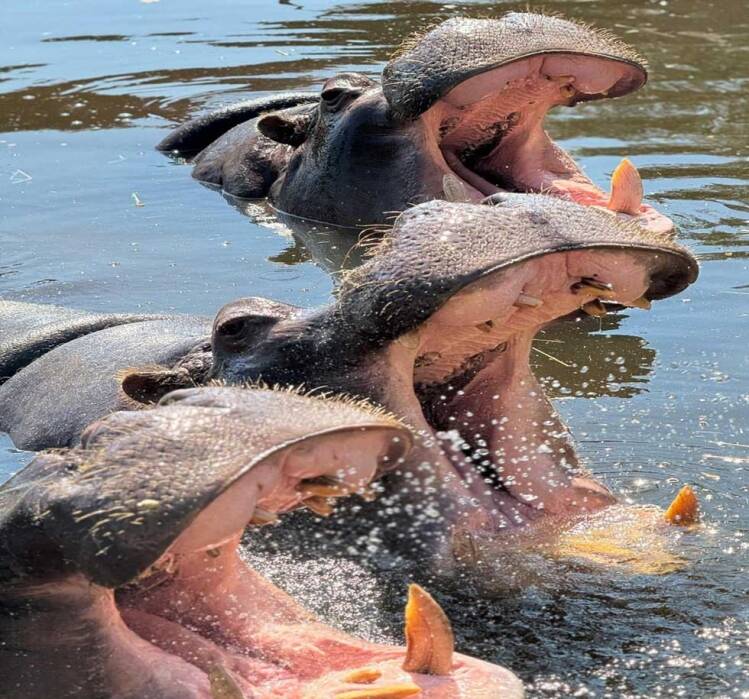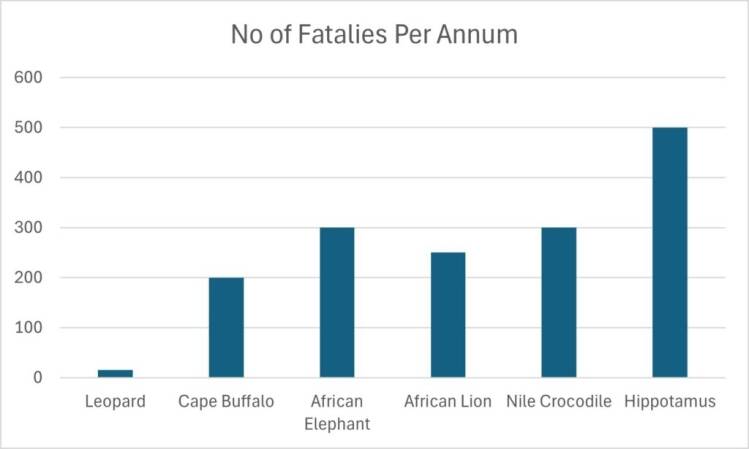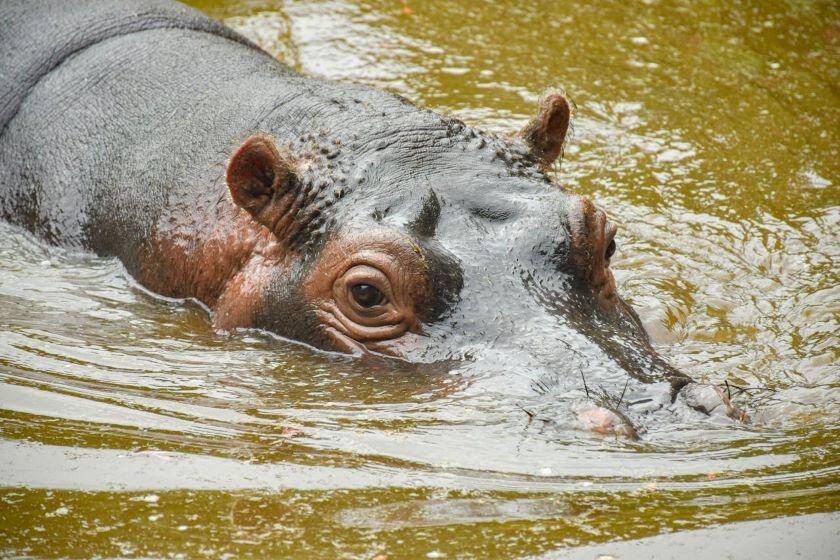Hippo hunting in Zimbabwe calls for adrenaline-seeking hunters with excellent shot placement and nerves of steel to come face-to-face with one of Africa’s most dangerous big game species: The Hippo (Hippopotamus amphibius).
The hippopotamus has the infamous reputation of being the African animal responsible for the most human deaths per annum. Hippos are incredibly fierce, and territorial and will not hesitate to attack should they feel that they or members of their pod are in any danger. They say that there is nothing on earth more vicious than a hippo cow separated from her calf. My suggestion? Don’t try to find out firsthand!
While you would not expect this mammal who seems so calm, wallowing in the water for up to 16 hours a day to be so violent, looks can be deceiving. The hippo has 36 teeth in its huge mouth and can easily bite a man in half. Although its bite power may not be as strong as that of a crocodile’s, it is up to 10 times more powerful than a human’s, measuring over 2,000 psi, and it can open its jaws to an astonishing 180° angle, which is enough to fit in any tasty morsel, big or small!

[DYNAMIC-BLOGTABLEOFCONTENT]
Key Takeaways
- Zimbabwe is seen as a dangerous game hunter’s paradise, offering a numerous members of the Big 5 and Dangerous 7 to target.
- The country offers authentic African safari hunts, with areas such as the Zambezi River Valley as well as Lake Kariba being prime spots for hippo hunting.
- Many hunters see the hippo as the most dangerous animal to target during a game hunting safari.
- Hippos cause more than 500 human deaths per year.
- Hippo hunting methods include the spot-and-stalk method, targeting the animal from the water or intercepting them on land – all dangerous options.
- When hippo hunting, consider getting a crocodile tag too, as these two members of the Dangerous 7 share the same habitat.
- Hippos face threats to their survival, including human-wildlife conflict, illegal hunting, and loss of natural habitat, with climate changes.
- Zimbabwe believes in ethical hunting practices when hunting in this popular destination.
- Zimbabwe remains a hunting destination of choice,
Zimbabwe: A Dangerous Game Hunter’s Paradise
This African gem is home to some of the world’s most dangerous game, allowing international big game hunters the opportunity to target these aggressive species on an exceptional hippo hunt.
Reasons why to choose Zimbabwe for your Dangerous Game Hunting Trip include:
- Hunters are spoilt for choice with the species on offer. Zimbabwe’s range of dangerous game include members of the Big 5, such as the lion, elephant, Cape buffalo, and leopard, and the two remaining members of the Dangerous 7, namely the hippo and the Nile crocodile.
- There are many excellent and varied dangerous game hunting opportunities throughout the country in numerous national parks and private concessions.
- Zimbabwe offers a real African hunting experience, with the hunter stalking his prey on foot, through the African wilderness.
- Areas like the Zambezi Valley, Lake Kariba, and Gwayi Conservancy allow for an authentic game hunting experience, with various dangerous game species available, including hippo hunts.
- Zimbabwe is easy to travel to, with excellent African outfitters ready and available to assist with an unforgettable big game hunting experience, including African hippo hunts.
- African outfitters go the extra mile to ensure an authentic African experience, but luxury is also the name of the game. Guests can expect comfortable accommodations, sumptuous meals, and modern amenities during their African hunt.
- As a tourist destination, Zimbabwe welcomed 1,043,781 visitors in 2022, leading the way as a prime African tourism destination, which included hunters.
The Hippo: The Most Dangerous Animal in Africa
Hippos are responsible for more than 500 human deaths per annum, even more than the notorious Cape buffalo. Many hippo attacks happen when humans are too close to the hippo’s habitat, such as bathing, fishing, or canoeing on the river.
These huge herbivores also leave the water during the evenings to graze, and people may encounter them on land, either heading out to start grazing or returning to the water in the early morning. Hippos see people as a threat to themselves and their pods and will attack and kill anything that threatens them.

Hippo Hunting in Zimbabwe: Back To Basics
Where are the Best Locations in Zimbabwe to Hunt Hippo?
Lake Kariba, in the north of Zimbabwe, is known for the humungous trophy specimens that are harvested there. Other popular areas include both the Limpopo and Zambezi Rivers, where hunters can target this sought-after dangerous game hunting species all year round, as Zimbabwe has no specific hunting season.
Hunting Methods & Calibers
The challenge when on a hippo hunt is to identify a good hippo trophy when they are literally up to their eyeballs in water! Look out for two bumps next to the nostrils. These bumps are the bottom tusks pushing up against the top jaw and usually indicate a male hippo. Males are also noticeably larger than females, with their tusks measuring 24-28 inches, compared to females whose tusks reach up to 20 inches.
Don’t be fooled, a hippo hunt is a dangerous and challenging African hunt that will challenge a hunter’s patience, perseverance, and shot placement. They are hunted by the spot-and-stalk method, either by quietly walking along the riverbank or secondly, targeting the mammal from a traditional canoe, called a mokoro.
Lastly, they can also be intercepted on land, as they enter or exit the water on their way to feed. Hippos emerge from the water at night, grazing throughout most of the night, and return to the water around sunrise. The easiest way to target them is to catch them as they make their way to or from the water.
The hippo is known for its incredibly thick skull and vertebrae, resulting in an animal that is exceptionally difficult to kill. When dangerous game hunting in Zimbabwe, the minimum requirement is a .375, with a 300-grain bullet. Should the opportunity arise to target the hippo out of the water, with the hunter taking a broadside shot, the bullet would need to be an accurate kill shot and enter the heart. The suggested rifle to complete this would be a .416 Rigby or 500NE, resulting in a fast, humane death for the animal.
Shot placement on your hippo hunt is critically important. Be sure to research this in detail and engage with your African outfitter with regard to their experiences with this member of the Dangerous 7. A hippo in water will take between 2-5 hours to rise to the top of the water after being successfully harvested. When attempting to retrieve your game hunting trophy, remember to keep a close eye out for crocodiles, as hippos and crocs share the same waterways and habitats.
Nile Crocodile & Hippo Hunts: A Match Made in Heaven
A hippo hunt, although exceptionally exciting, can also be very unpredictable. You may strike lucky on the first day and then sit around for the rest of the hunt, or you may use the entire hunting safari to harvest your trophy bull.
Either way, a suggestion would be to chat with your African outfitter and try to secure a tag for a Nile crocodile. Not only do the Nile crocodile and hippo share the same habitat, but the thrill and adrenaline of hunting two of Africa’s most infamous killing machines will be memorable – with great additions to your trophy room!
Another alternative is to target the African plains game in the area. Your outfitter is a wealth of information, speak to them about possible species that can be hunted.
What Threats Does the Hippo Population in Zimbabwe Face?
Human-Wildlife Conflict
Human-wildlife conflict (HWC) is a situation where animals pose a direct and recurring threat to the safety and/or livelihood of humans. The challenge is that these conflicts can lead to people killing the animals concerned, leading to their numbers declining.
In the case of hippos and human conflict situations, these arise for numerous reasons, including:
- Direct attacks on people.
- Loss of natural habitats means that the hippos are more visible and share habitats with humans, for example, humans use rivers and lakes for fishing or recreation.
- Crop Raiding and damage to crops are a huge source of frustration. When hippos leave the water to graze at night, they enter fields of crops and consume them, as grazing may not be sufficient.
- Humans become frustrated and have no interest in the conservation of the species.
- Hippos may prey on farmers’ livestock, which is their source of income, leading to increased frustration with the mammal.
Loss of Natural Habitat
As human populations grow and cities expand, the natural habitat of this mega mammal decreases. The area becomes utilized for farming, or urban development takes place, resulting in their natural habitats, such as rivers, streams, wetlands, and lakes, disappearing. This results in them encroaching on human lands, and the inevitable human-wildlife conflict.
Climate Change
As the climate around them changes, so will the hippos’ chance of survival. Rainfall can cause their habitats to need to survive in flood or drought situations, which can also influence the availability of food and shelter and cause major disruptions to their ecosystems, and therefore their survival.
Illegal Hunting: Hippo Products
Hippos are often hunted illegally for their products including meat, their hides, and their tusks (ivory). The meat is sold off, while their hides are used to make and manufacture various products including jackets, belts, purses, and wallets, as well as suitcases and watch straps, amongst an array of leather goods.
The ivory is often used to make carvings, trinkets, sculptures, and souvenirs.
Pollution
Hippo habitats are becoming threatened as dirty water used in various industries such as mining and agriculture can affect both the hippo and its prey.
How Do Hippo Hunts Contribute to Conservation?
Numerous benefits come to mind, firstly a range of economic benefits including job opportunities, improvement of local infrastructure, and an increase in government revenue.
Hunters targeting hippos are also able to assist the community at large by dealing with “problem” animals in the area, whether hippos, crocodiles, or other problem animal. In this way, the community is also reassured that their needs are being met, the hunter can dispose of the animal and the meat distributed to the tribes in the area.
The community plays a large role in the conservation process. They are the ones on the ground, who must deal with the challenges of hippos in the area (for example hippo attacks and crop raiding), and education and awareness remain key in promoting conservation.
They also reap the benefits of African hippo hunts, as well as other hunting safaris, as these endeavors provide employment opportunities with local outfitters, for example, cleaners, workers, trackers, and skinners. Infrastructure gets an upgrade with roads, schools, and clinics being built, while the meat from the hunts also assists in feeding local communities.
These conservation efforts protect the animals’ habitats, and effort is enlisted in finding ways for the peaceful co-existence between humans and animals, in this case, hippos.
Ethical Hunting in Zimbabwe
What is Ethical Hunting?
This refers to a set of behaviors, rules, and regulations that guide and shape a hunter’s behavior during a hunt.
It includes aspects such as complying with and adhering to the rules and regulations of the local hunting community, in this case, Zimbabwe. It involves adequately preparing for your hunt to ensure that you have the correct caliber weapon, to ensure a quick, humane death for the animal and minimal suffering on its part.
Zimbabwe practices the principle of fair chase, ensuring that there is no unfair advantage given to the hunter over the animal being targeted.
The hunter will support and assist wildlife conservation efforts by practicing sustainable hunting endeavors.
How do Hunters Learn to Hunt Ethically?
By educating novice hunters through courses, and by mentoring and looking at more experienced hunters in the area, hunters learn the art of ethical hunting. Hunters need to reflect and consider their actions, and reactions and how their behavior influences (either positively or negatively) and impacts animals, communities, habitats, and environments.
True respect for rules, regulations, traditions, cultures, communities, and the hunted animals all play a role in ethical hunting.
Frequently Asked Questions
Are there hippos in Zimbabwe?
Yes, there are hippos in Zimbabwe. Lake Kariba is known for its exceptional hippo trophies, but there are many regions across the country where they can be hunted, including the Limpopo and Zambezi Rivers.
Why do people hunt hippos?
While traditionally hippos are hunted for ivory, modern game hunting enthusiasts also enjoy a hippo hunt that challenges their hunting skills. As one of Africa’s Dangerous 7, the hippo is a sought-after trophy for many hunters.
Which African countries have hippos?
Hippos are found in a variety of African countries, with the most popular countries for hippo hunting including Zimbabwe, South Africa, Namibia, Zambia, Mozambique, Tanzania, and Botswana.
Does the Zambezi River have hippos?
Yes, the Zambezi River is the perfect habitat for hippos. Forming the border between Zambia and Zimbabwe, the Zambezi River is a popular destination for a hippo hunt.
Do hippos have any predators?
Hippos share habitats with the Nile crocodile, one of the most feared predators on earth. While not many animals are willing to take on a fully grown, aggressive hippo, their offspring do fall prey to crocodiles, lions, and hyenas.
Where is the best place to hunt hippos in Zimbabwe?
Lake Kariba is known for its superb hippo hunts, producing exceptional quality trophies. Many hunters also combine a hippo hunt together with a crocodile hunt, since they share the same habitat.
Are hippos afraid of any animals?
Due to their size, stamina, and sheer aggression, hippos are not afraid of many animals, apart from themselves.
Zimbabwe: Great Destination, Great Hunting, Great Trophies!
Zimbabwe boasts great dangerous game hunting opportunities for hunters at a reasonable cost, with luxurious accommodations and facilities, while simultaneously offering exceptional trophy animals and the option to enjoy a game hunting safari throughout the year. With attentive and professional outfitters, a location second to none, and wildlife at your fingertips, what more could a hunter need?
A hippo hunt not only allows the hunter to face Africa’s most dangerous animal (funnily enough a herbivore and not a predator as one would assume!) but allows him to test his skills and expertise ethically and respectfully. The hunter has the opportunity to see conservation in action in one of Africa’s gems, where animals are both hunted and respected, where their livelihoods are closely intertwined with those of their human counterparts, and success can only be achieved through ethical hunting, conservation, and adherence to regulations and permit quotas.
This is Africa. As wild and dark as the continent may seem, it is home to mankind’s greatest gifts; a wide range of fauna and flora that is immeasurable in its beauty and vastness. They say that Africa gets under your skin, and after a trip here, you will never forget it. Take that step, book that hunt, and let Africa show you its charm and beauty.
If you have what it takes to take up the challenge and enjoy hippo hunting in Zimbabwe, you won’t be disappointed. This untamed destination provides exciting and thrilling hippo hunts that test your skills, and patience, and allow you to come face-to-face with the African wilderness of old.
Still not sure? Read more about this undiscovered African gem in the article entitled: “Why Go Hunting in Zimbabwe?”
Author: B. Hershensohnn
